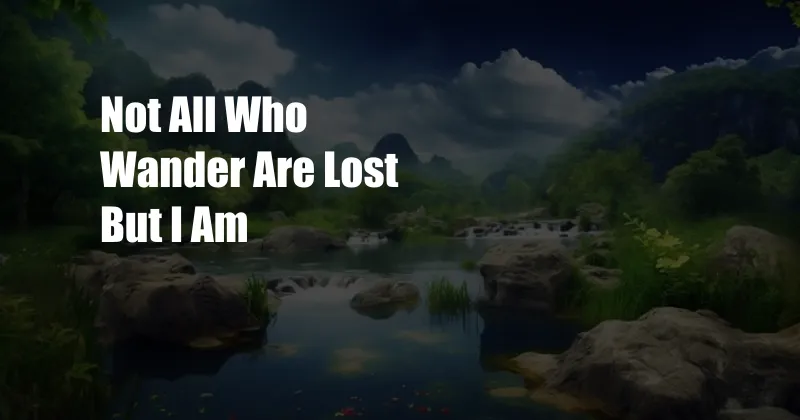
Not All Who Wander Are Lost, But I Am: Embracing the Uncertainty and Joy of Uncharted Paths
The lure of the unknown, the thrill of the unexplored- they have always been irresistible forces in my life. Growing up, I spent countless hours lost in the woods behind my house, crafting secret paths and fortresses among the towering trees. The feeling of wonder and discovery, of being a pioneer in my own backyard, filled me with an indescribable joy.
As I ventured beyond my familiar surroundings, I found that the world was a labyrinth of hidden trails and unexpected turns. From the bustling streets of foreign cities to the remote trails of distant mountains, I wandered without a compass or a map, guided only by my curiosity and a yearning for the unknown. And while I may not have always found my way back to where I started, I discovered something far more precious- the boundless joy of getting lost.
Embracing the Unknown: A Journey of Self-Discovery
In the realm of wandering, there is a profound lesson to be learned. It is not in reaching the destination that we find fulfillment, but in the journey itself. When we embrace the unknown, we open ourselves up to a world of possibilities, both within ourselves and beyond. We discover hidden strengths, cultivate resilience, and develop a deeper appreciation for the beauty of the unexpected.
Moreover, wandering allows us to connect with our true selves. Amidst the unfamiliar landscapes, we are stripped of our masks and pretenses. We confront our fears, challenge our limits, and discover the depths of our own being. It is in these moments of solitude and introspection that we find a clarity and authenticity that is often elusive in the comfort of the known.
The History and Meaning of Wandering
Throughout history, wandering has been an integral part of human experience. From the nomadic tribes of ancient times to the legendary explorers of the modern era, humans have always been driven by an insatiable desire to venture beyond the boundaries of the familiar.
In literature, wandering has been a recurring theme, symbolizing both physical and metaphorical journeys of self-discovery. From Homer’s Odyssey to Kerouac’s On the Road, wandering has been portrayed as a catalyst for transformation and growth, a path that leads to new perspectives and a deeper understanding of the world and ourselves.
Modern-Day Wanderers: Navigating the Digital Age
In the fast-paced, technology-driven world of today, wandering has taken on new forms. While we may not always have the luxury of embarking on physical journeys, we can still wander virtually through the endless corridors of the internet, explore different cultures and perspectives, and connect with people from all walks of life.
Social media platforms, online forums, and virtual reality technologies have opened up new avenues for us to satisfy our wanderlust. We can embark on virtual expeditions, learn about distant lands, and engage in discussions with individuals who share our passions and interests, all from the comfort of our homes.
Tips and Expert Advice for Embracing the Joy of Wandering
If you find yourself yearning for a life less ordinary, here are some tips and expert advice to help you embrace the joy of wandering:
- Let go of your fear of getting lost. The beauty of wandering lies in the unknown, so don’t be afraid to veer off the beaten path.
- Be open to serendipity. Embrace the unexpected encounters and spontaneous adventures that come your way. You may stumble upon hidden gems that you would have missed otherwise.
- Embrace the solitude. Wandering alone can be a deeply transformative experience. Take advantage of these moments to reflect on your thoughts and feelings, and connect with your inner self.
- Keep a journal. Document your wanderings, both physical and virtual. This will allow you to look back on your journey and appreciate the distance you have traveled.
- Share your experiences with others. Tell stories of your adventures, inspire others to step outside their comfort zones, and create a community of fellow wanderers.
Remember, wandering is not a destination, but a state of mind. It is an ongoing journey of exploration, self-discovery, and uncharted paths. Embrace the uncertainty and the joy of the unknown, and you will find that the world is a much more fascinating and fulfilling place than you ever imagined.
Frequently Asked Questions about Wandering
Q: Is it okay to wander alone?
A: Absolutely! Wandering alone can be a deeply rewarding experience, allowing you to focus on your thoughts and feelings and connect with your inner self. However, it is essential to take safety precautions, such as informing someone of your plans and staying aware of your surroundings.
Q: How can I wander without getting lost?
A: While getting lost can be part of the fun, it is wise to have a general idea of where you are going. Bring a map of the area, use a GPS device, or download offline maps on your smartphone. Let someone know your planned route and expected return time.
Q: How can I start wandering more in my daily life?
A: Start by taking a different route to work or school, exploring a new neighborhood, or trying a new restaurant. Step outside of your comfort zone and embrace the unknown. You may be surprised at the hidden gems you discover right in your own backyard.
Conclusion
In the words of J.R.R. Tolkien, “Not all who wander are lost.” Wandering is a mindset, a way of embracing life’s adventures and challenges with an open heart and a sense of wonder. It is not about reaching a specific destination, but about the journey itself, the experiences and discoveries along the way. Whether you wander physically or virtually, embrace the unknown and let the journey of self-discovery unfold before you. Are you ready to wander?